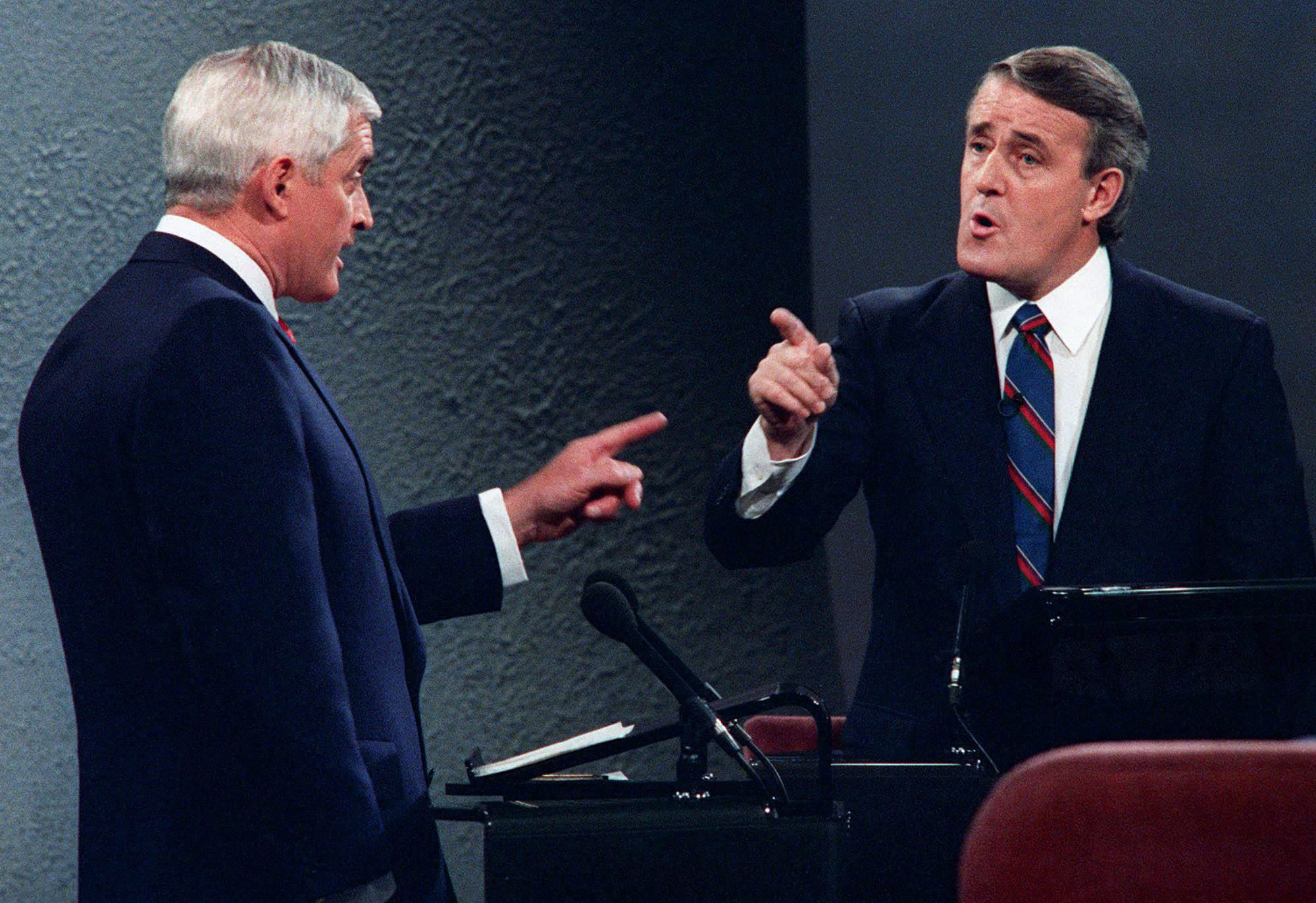Watch the full English-language debate and post-debate scrums:
By Andrew Thomson | UPDATED September 9, 2021 5:08pmET
Televised leaders’ debates don’t always produce knockout blows or radically alter a federal election result.
But in a campaign where the Conservatives and Liberals are virtually tied in popular support, and where the NDP and Bloc Québécois smaller parties could again hold the balance of power in a minority Parliament, this week's debates could be pivotal.
WHAT TO WATCH FOR
Five party leaders will contend with five topics over the two-hour English debate:
- Affordability
- Climate
- COVID recovery
- Leadership and accountability
- Reconciliation
According to the Leaders’ Debate Commission, each segment will include a:
- Question from a voter
- Question from the moderator or a journalist to each leader
- Leader-to-leader-to-leader debate (3 of the 5 leaders)
- Open debate (all 5 leaders)
Watch the full French-language leaders' debate and post-debate scrums (September 8):
Five party leaders will again take part in the English debate: Yves-François Blanchet (Bloc Québécois), Annamie Paul (Green), Erin O’Toole (Conservative), Jagmeet Singh (NDP), and Justin Trudeau (Liberal).
A leader with a positive COVID-19 test can take part virtually instead of attending in-person at the Canadian Museum of History in Gatineau, Que. (Random draws were held last week to determine podium positions and speaking order.)
But not participating at all is People’s Party of Canada Leader Maxime Bernier, who took part in the 2019 debates after being initially excluded.
The commission announced last month that neither the People’s party nor the new Maverick party met any criteria for inclusion:
- a sitting MP elected under the party’s name when the last Parliament dissolved;
- at least 4-per-cent support in the overall 2019 popular vote;
- at least 4-per-cent national support in polling five days after the campaign began, based on the average result from nine major polling firms (chosen by an advisory committee of political scientists).
Shachi Kurl, president of the Angus Reid Institute, will moderate the English-language debate, with participation by journalists Rosemary Barton (CTV), Melissa Ridgen (APTN), Evan Solomon (CTV), and Mercedes Stephenson (Global).
CREATING THE DEBATE COMMISSION
For decades, the country’s largest broadcasters were solely responsible for organizing the televised debates: the time, location, questions, and which leaders could participate.
The first debate took place on June 9, 1968 with Pierre Trudeau, Robert Stanfield, Tommy Douglas, and Réal Caouette. The next two didn’t occur until 1979 and 1984.
Liberal Leader John Turner and Conservative Leader Brian Mulroney point fingers at each other during a 1988 leaders' debate. (The Canadian Press/Fred Chartrand)
Past disputes over which party leaders were eligible to take part led the 2015 Liberal platform to promise an “an independent commission to organize leaders’ debates and bring an end to partisan gamesmanship.”
That same year, the Conservative Party of Canada rejected the traditional consortium for a series of debates held by Maclean’s, The Globe and Mail, the Munk Debates, and the TVA network. (Although the broadcast consortium did organize a French-language debate.)
So former governor general David Johnston, who moderated the 1979 and 1984 debates, was the government’s choice in 2018 to head a new $5.5-million “independent and impartial” commission charged with overseeing two debates — one English and one French — during the 2019 campaign.
Johnston was tasked with creating a seven-member advisory panel to settle on a debate format, oversee technical production, and provide the debate feed free of charge.
The Leaders’ Debate Commission would also determine which leaders would have a podium on the stage.
But former NDP MP Nathan Cullen immediately criticized the process of selecting Johnston, if not the nominee himself, arguing the commissioner should have unanimous party support as recommended in a March 2018 report by the Commons procedure committee.
Conservatives also aired their opposition to the very creation of a commission.
Former Green leader Elizabeth May, who unsuccessfully sought legal action to be included in the 2011 debates, lauded the commission but also bemoaned the announcement of a commissioner without all-party support.
And Conservatives disagreed with the 2018 procedure committee report, arguing a commission was unnecessary and a “poorly-considered option.”
The 2019 criteria required two of the following criteria for a party leader to attend:
- an elected MP at the time the election is called;
- intention to run candidates in at least 90 per cent (304) of Canada’s 338 electoral districts;
- four-per-cent popular support in the previous election or a “legitimate chance to win seats in the upcoming election.”
Those rules initially excluded the PPC. But the commission reversed course and invited Bernier, with Johnston announcing the PPC had a “legitimate chance of electing more than one candidate.”
Johnston had told CPAC’s Peter Van Dusen that the criteria had “an element of subjectivity” — but that he was “quite comfortable” with the minimum requirements; polling results, party history, and campaign efforts would be the likely measuring sticks to determine who could legitimately win seats.
“On the one hand, you want as wide and broad a participation as possible,” Johnston said. “On the other hand, you want to have sufficient focus that the people who are appearing do represent significant political interests.”
TVA and Maclean's/Citytv also hosted 2019 debates; Liberal Leader Justin Trudeau did not attend the latter. Trudeau also declined a Munk Debates invitation for a foreign policy debate that was subsequently cancelled.
TOP PHOTO: Leaders take part in the French-language commission debate on Sept. 8, 2021. The Canadian Press/Sean Kilpatrick




